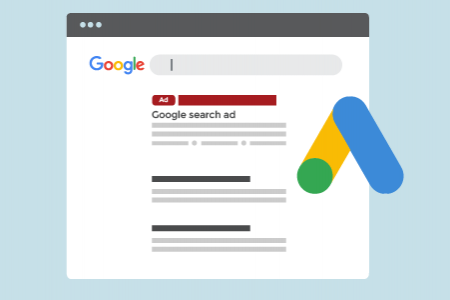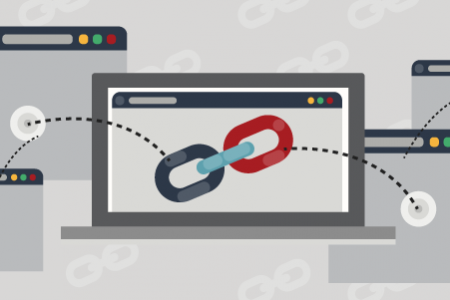We aim to respond to all messages within 1 business day. You'll be hearing from us soon!
In the meantime, perhaps you'd like to learn more...
AdWords Management Basics for the DIYer
 Image credit: stuff.co.nz
Image credit: stuff.co.nz
As New Zealanders we've got a proud do-it-yourself attitude and it's no surprise many Google AdWords advertisers want to have a crack at running their AdWords campaigns themselves. I love the DIY mindset, and so with the DIYers in mind (and in the spirit of Xmas) I'm giving away some basic AdWords management tasks you absolutely must perform on a regular basis.
This is the first in a two part series - there’s more to come next month, so be sure to check back for the sequel.
Achieving success with AdWords depends on a complex blend of factors; robust keyword research, defining and implementing the most appropriate campaign structure, crafting unique ads that stand out, drive clicks and set the precursor for conversion, setting up conversion tracking, plus a solid understanding of what makes a good landing page. And that’s just the set-up phase.
Then there's the ongoing AdWords management tasks; bid adjustments, ad testing, identifying new keywords and pausing/deleting underperformers, creating and fine tuning rules, budget checks, day parting and so on.
With AdWords ads taking up a growing proportion of the search results screen real estate and a growing number of competitors vying for top 3 positions, there's simply no place for a set and forget approach. Without careful monitoring and regular management it's easy to lose money fast.
I've seen enough poorly setup and managed campaigns (e.g. one Ad Group, one broad match keyword and campaign settings running on auto pilot) to know that unless you've got plenty of time up your sleeve to set up and manage AdWords the right way, then you really are better off leaving it to the people who do this stuff day in day out.
1. Check for keywords below first page bid
If any of your keyword bids are below Google's recommended first page bid, your ad won't show on the first page of results. It probably won't get any clicks either. To find these keywords go to the Keywords tab, click the 'Filter' drop down > 'Create filter' > 'Status' and un-tick all check boxes except the one that says 'Below first page bid'. Next, click 'Apply' and you'll get a list of any keywords with bids below the level required for your ad to show on the first page of Google's results.
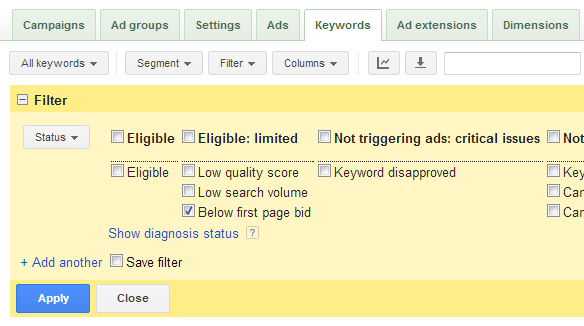
Simply update the bids to the recommended amount and you're done. Tip: When do so check to see what average position the ad is being displayed in. Typically I'll bid a little higher than minimum first page bid just to make sure I'm not revisiting the keyword a few days down the track and having to increase it again, plus I'm not a fan of ads that don't drive any traffic because they only appear at the bottom of the right hand column - unless of course they do enough to actually convert!
2. Check Quality Scores (and take steps to improve them!)
I won't go into a long explanation about Quality Scores in this post - there's plenty of good stuff about that around already. In a nutshell, the higher your Quality Scores are, the less you're going to need to pay per click. It's Google's attempt at rewarding relevance and taking steps to prevent the advertisers with the biggest budgets from winning the ad auction solely on bid price.
If you've got any keywords in your account with low quality scores (say, 4 and below), then make changes in an effort to improve them. Use the filter below to find them:
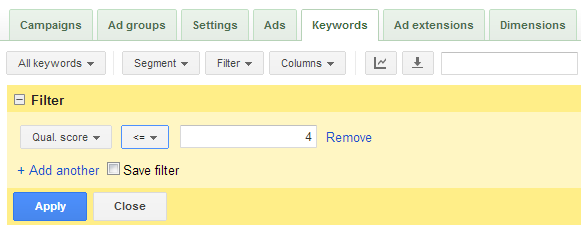
To learn more about what's bringing your Quality Score down, simply hover on the speech bubble in the 'Status' field on the 'Keywords' tab.
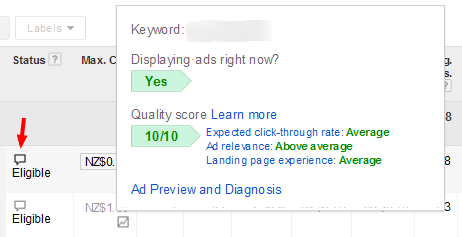
If you can't improve your Quality Scores over time, I'd strongly consider pausing the offending keywords. Once again check to make sure that you're not pausing a keyword that converts well. Conversion is where it's at, so let those metrics shape your decisions. It just might be that the costly keyword with the low Quality Score actually punches well above it's weight and is worth the time spent trying to improve Quality Score because it delivers online sales/leads or makes the phone ring.
3. Check your ad positions
While it's certainly not a race to the top, it goes without saying that ads in the top 3 spots get significantly more clicks than those in the lower right hand column positions. Don't get caught up paying over the odds just to drive clicks though. Always keep your eye firmly on conversions and only bid up to the point where the cost of conversion is sufficiently covered by the value of the product or service you're selling. You do have conversion tracking set up, right? And Google Analytics goals too?
Remember also that some keywords are likely to be too competitive, so perhaps you're better off not targeting them at all. Lastly, don't just keep increasing bids in order to get to the top - always look for ways to improve your Quality Scores first. It’ll pay dividends in the long run.
These 3 AdWords management tasks are just some of the daily/weekly checks that will go a long way to making sure your account ticks over nicely and doesn't take your money without giving you something in return. Let's be clear, they're the basics and they won't transform your campaign from a lemon to a peach, but they will help you prevent your campaign from getting out of hand if don’t have the resources or inclination to get the experts to take care of it for you.
Are you an AdWords DIYer? Let us know some of your pain points when it comes to managing your AdWords campaign. Drop a comment below and I'll try and address them in part 2 of the series next month.
Written by Mark Vassiliou
Mark is the Manager of Digital Marketing at Apex and has worked in the digital marketing industry since 2004. Prior to joining Apex he worked in a variety of traditional marketing roles in both the corporate and SME environment in NZ and abroad, but these days much prefers the tangible measurability and transparency of digital marketing.Related posts
AWESOME! LET'S GET STARTED
TELL US HOW WE CAN HELP
We aim to respond to all messages within 1 business day. You'll be hearing from us soon!
In the meantime, perhaps you'd like to learn more...



